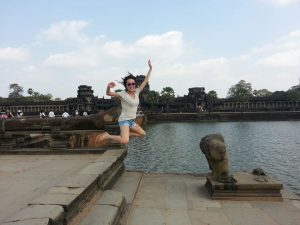Mona is a former staff member of PAN.
Mona Lee joined PAN in January 2015 as the Greater Vancouver Site Coordinator for the Positive Living, Positive Homes study and went on to become PAN’s Manager of Evaluation. She has a B.Sc. from U BC and a Master’s in Public Health at SFU.
BC and a Master’s in Public Health at SFU.
What first piqued your interest in HIV research?
My interest in HIV sparked with my trip to Swaziland in 2008, during which close to half of the Swazi population was living with HIV/AIDS. It was not an exaggeration to say that every Swazi person was affected by HIV and AIDS in some manner. Despite the severity, this large population burden was not addressed. HIV was a highly stigmatized and taboo topic, and people living with HIV/AIDS were harshly discriminated against. As a result, there was an increased barrier to access healthcare services and acquire necessary medicine, which further led to increased vertical transmissions of HIV to the next generation. Angered and concerned by the situation, I took a UBC course called “HIV Prevention and Care” upon my return and started volunteering at the Dr. Peter Centre. With an ongoing exposure to HIV and social determinants of health both “on the ground” and through academic courses, I realized that there is a need for research and evidence-based programs and policies with a greater focus on the community. Naturally, my research interest has evolved around community-based research, as it made the most sense to have the people who are most affected by the outcomes of research be at the centre. Luckily, the Positive Living, Positive Homes study has given me the opportunity to marry my two interests – HIV and community-based research.
How is your research applicable in the “real world”?
I believe that the Positive Living, Positive Homes (PLPH) study serves as a vehicle to create meaningful action and changes in the real world. PLPH is community-based research that arose out of concerns and dialogues between people living with HIV/AIDS (PLWHA), frontline workers, community organizations, and academia, regarding HIV and access to affordable and appropriate housing. The research question addresses a real world problem, and the collaborative manner through which research methodology was developed and data analysis and knowledge translation will be implemented has real world implications. For example, the diversity of roles each team member plays on the study and in the community reflects a wide range of avenues through which the community can utilize the information gathered (e.g. raise awareness). This happens at both micro (community) and macro (regional/provincial policy) levels to improve services and programs, develop partnerships, increase collaboration, create effective housing policy, and share knowledge.
How is the community involved in your research?
The community is involved in every step of the way in PLPH. As mentioned above, the research question and methodology were collaboratively formed by div erse community stakeholders. Many community members are sitting on the team in various roles (e.g. collaborator, person living with HIV consultant, and knowledge user) and they will take an active part in all future phases of the study (data collection, data analysis, and knowledge translation/data dissemination). Furthermore, the study is committed to community-based research principles, which include equitable community partnerships, inclusive decision making, and co-learning processes.
erse community stakeholders. Many community members are sitting on the team in various roles (e.g. collaborator, person living with HIV consultant, and knowledge user) and they will take an active part in all future phases of the study (data collection, data analysis, and knowledge translation/data dissemination). Furthermore, the study is committed to community-based research principles, which include equitable community partnerships, inclusive decision making, and co-learning processes.
If you had unlimited funds, which areas of research would you invest in?
I think right now is a critical time for us (as a global world) to galvanize our energy and attention to research and action on environmental health and climate change before it’s too late. Without a healthy natural environment, we cannot have healthy people – this applies to all facets of health (physical, mental, or social) and regardless of disease nature (communicable or non-communicable).
If you were able to choose, what is the natural talent you’d like to be gifted with and why?
This is somewhat of an unrealistic talent… It’s definitely more of a super power… I’d love to be able to teleport! Wouldn’t it be amazing to utilize the time we spend on transportation each day on other things like sleeping?!
